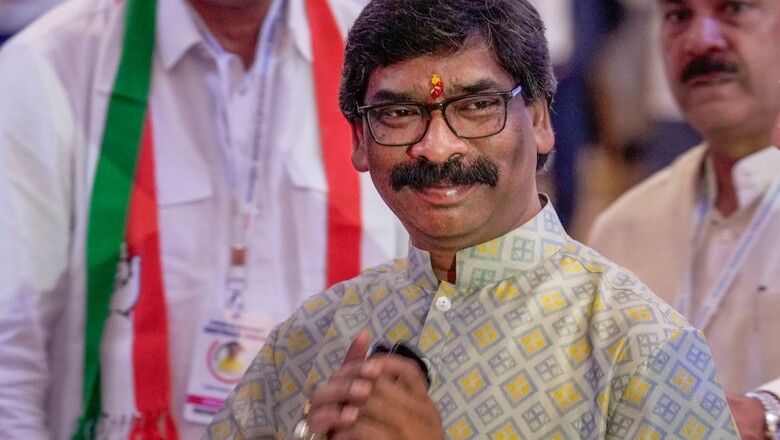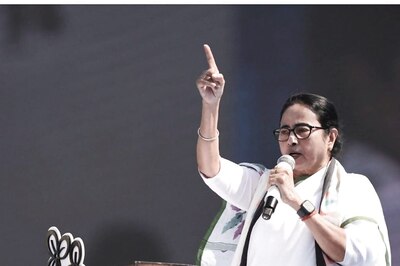
views
Media is rife with rumours that Jharkhand chief minister Hemant Soren is most likely to appoint his wife as CM, because of his imminent arrest by the Enforcement Directorate on serious charges of corruption. The situation in the state is unerringly similar to the “Jungle Raj” of Bihar of the 1990s. Sections of the media are interestingly referring to it as “Rabri Devi redux”. Irrespective of whether the speculation turns out to be true, the similarity goes beyond just the imminent political appointment.
Law and order of the state is in a shambles, the youth in various parts of the state are on the streets on the issue of unemployment, there are serious corruption charges against the CM himself, and dynastic politics is at its peak both in letter and spirit—all reminiscent of Bihar in the last decade of the last century. It is perhaps a good time to take stock of what has transpired in the state in the last four years under the present government politically, socially, and economically.
Let me begin with a very interesting but shocking anecdote.
Addressing an election rally in Jharkhand’s Ramgarh on February 23, 2023, the CM said, “Paisa plastic me rakh kar zameen me gaad do, maine humesha kaha hai, paisa bank me mat rakho (Keep your money in plastic bags and bury it in the ground. I have always said, do not deposit your money in banks).
Yes, you read it right: an elected chief minister of a state exhorting the public to stay away from the formal banking system. These words capture in many ways the essence of the government’s economic vision (or the lack of it) for the state. In the last four years, Jharkhand has descended into administrative chaos marred by similar regressive policies and thinking in all spheres.
Corruption
Chief minister Hemant Soren’s alleged allocation of mining rights to himself is a blatant abuse of power, typical of “Jungle Raj”. Soren’s closest aides have been arrested, indicating a widespread network of corruption infiltrating the highest levels of his administration.
The government is even accused of the diversion of PM-GKAY rations, meant for the underprivileged, depriving the society’s most vulnerable sections.
Each sector, whether it be mining, land resources, or land revenue is marred by the presence of a large number of middlemen and brokers from the block level to the secretariat indicative of a well-oiled collusive system of rent-seeking, and systemic failure of public institutions.
It will not be an exaggeration to say pictures of hordes of cash being recovered from a Congress MP’s premises in the heart of the state capital Ranchi very well capture the extent of moral degradation of public offices in the state.
Failure on key promises
As per NCRB data, under the incumbent government, Jharkhand is one of the leading states in crimes like murder and rape. Criminals sitting in jails are emboldened enough to threaten the heads of media houses with dire consequences. One interaction with businesses in industrial towns like Dhanbad is enough to tell you that extortion from businessmen in the name of protection money has become a major menace. No wonder, private investments have been reduced to a trickle. Even announced projects are not seeing the light of the day. This, in a state with the highest mineral wealth in the country, does not augur well for the development of the nation.
The chief minister’s grand promise of providing 5 lakh jobs in 5 years stands in stark contrast to the harsh reality: a mere 357 jobs have been realised, as his government admitted in the assembly.
The commitment to conduct 4 JPSC exams each year has fallen by the wayside, with only 1 exam conducted in 4 years. The 7,587 recruitments in the Group 3 JPSC exam are mostly carryovers from the previous BJP government, a fact that speaks volumes about the current government’s inaction and inability to initiate new opportunities. The entire selection process for the appointment of panchayat secretary, completed under the BJP government in 2019, was left in limbo for 4 years by Hemant Soren’s administration.
The situation was similar for clerical appointments. Only after the Supreme Court’s reprimand did the government reluctantly distribute appointment letters. Today, the streets of Jharkhand are filled with the voices of our youth, crying out for jobs and opportunities. Groups like chowkidar, panchayat, secretariat, and divyang individuals are raising their voices, yet they find no audience with the government.
Lip service on tribal issues
Prime Minister Narendra Modi became the first PM to visit Bhagwan Birsa Munda’s native village Ulihatu when he launched the Viksit Bharat Abhiyan from there on November 15. On an occasion to kickstart a programme to achieve 100 per cent saturation of schemes, the CM said, “Achhi baat hai desh ke PM pehli baar aaye, hum sab toh yahan aate rehte hain.” This remark is a stark reminder that the incumbent government in Jharkhand has not progressed beyond lip service and symbolism as far as tribal issues as concerned.
After having annulled the domicile policy of the previous Raghubar Das government, the Hemant Soren government has failed to come up with a domicile policy of its own that can stand legal scrutiny. In a sign of major political desperation, within a span of 1 year, the government has done a volte-face on the issue of domicile by declaring 1,932 land records as the cutoff date for the definition of a local. This is a stance the CM himself criticised in the state legislative assembly on March 23, 2022, declaring that “…a domicile policy based on 1932 Khatiyan alone will be struck down by courts in one minute.” Without a domicile policy, state employment has suffered in the last 4 years and impacted locals/tribals the most, a segment the CM claims to represent.
The chief minister and his close aides, many of whom are behind bars, are accused of grabbing huge parcels of tribal land, making a mockery of the very same Chota Nagpur Tenancy Act, which the CM had accused the previous BJP government of diluting when he was in opposition.
Politics of appeasement
The unchecked influx of migrants, many allegedly hailing from Bangladesh, has notably changed the demographics in several regions like Sahibganj, Santhal Pargana, Bhoganandi, and Godda in the last 4 years. This demographic shift is worrisome for many tribal communities, who now culturally and socially feel sidelined. Incidents of forced eviction of Mahadalit families and the atrocities on tribal girls are rampant in some parts of the state. Reports of forced religious conversions and marriages of tribal girls are not just social issues; they are direct assaults on the cultural and social fabric of our indigenous communities.
Under the aegis of Hemant Soren’s leadership, there’s a growing perception that the state’s governance has swayed towards religious appeasement as evidenced by the decision to drop charges against thousands protesting the Citizenship Amendment Act and NRC.
Conclusion
As someone who grew up in Bokaro in the 1990s, we were the children of promise, the heirs to a legacy of progress and prosperity that set us apart in erstwhile Bihar. Anyone living in Jharkhand in the early 2000s will tell you that the first government under Babulal Marandi (present BJP state president) did raise hopes through very good work in infrastructure and law and order. But unfortunately, political instability did catch up with the development of the state in later years.
JMM’s mantra for politics in this government has been simple: Blame the past BJP governments when questioned on key matters of development. It is noteworthy to mention that for all the rhetoric of lack of fund support from the Centre, the JMM-led government had accepted that the state got more funds from the Centre under the Modi government than the previous UPA regime on the floor of the legislative assembly.
Contrary to popular perception, the Soren family has been part of the government for more than 11.5 years of the 23 years of the state’s existence. They are the pre-eminent political family of the state whose accountability in power should be established both politically and legally.
The CM is not responding to the ED summons, knowing fully well that he can be arrested, given the seriousness of the charges. The obvious political calculation: gain sympathy by being seen as a “martyr” in the voters’ eyes. It is at best a clichéd, jaded political tactic that the Jharkhand voters can see through.
The story of Jharkhand is one of potential and promise. The gains of the state’s creation and good work by the past governments have been squandered away in the last 4 years. Jharkhand is fed up with this politics and yearning for change politically, and more importantly a reset, free from appeasement, corruption, and dynasty.
The author was born and brought up in Bokaro, Jharkhand. He is a member of the board of governors of IIM Shillong and also served as OSD to the Union Finance Minister ( 2021-2023). Views expressed in the above piece are personal and solely those of the author. They do not necessarily reflect News18’s views.




















Comments
0 comment